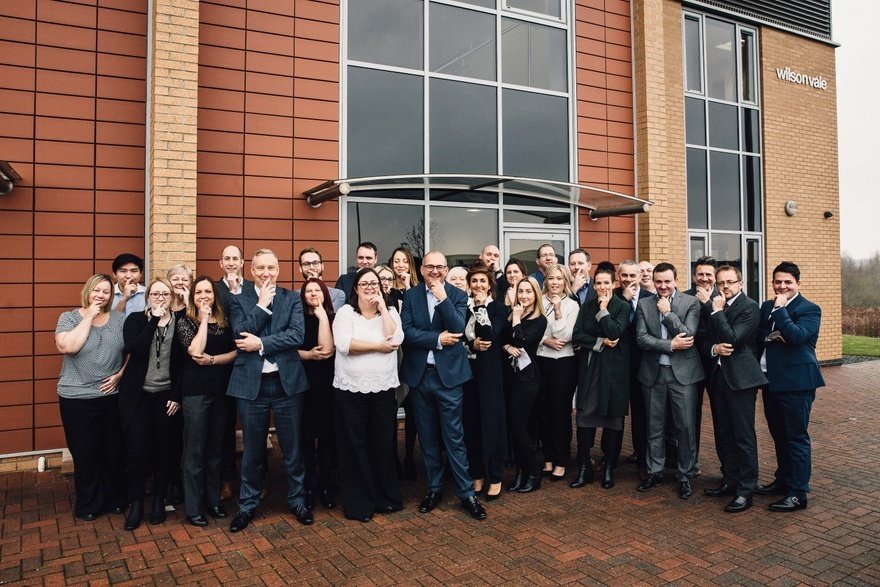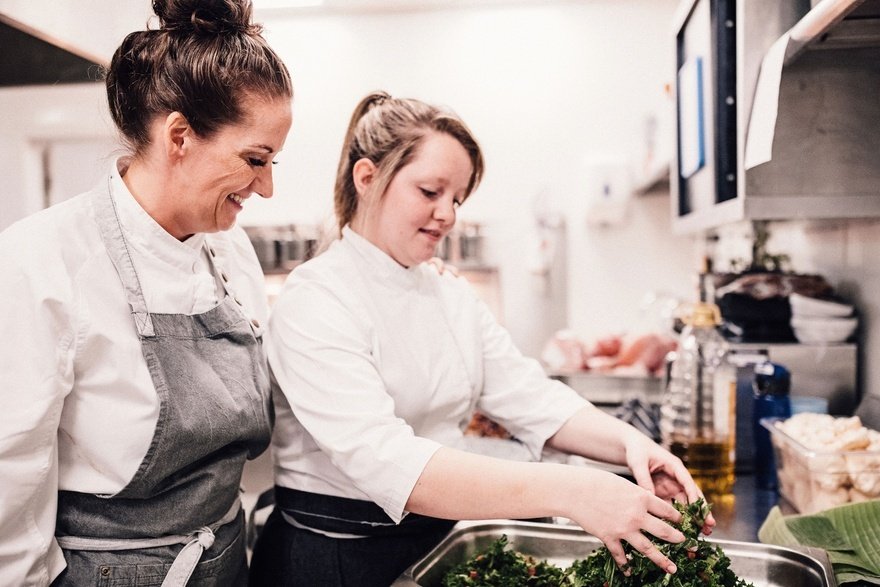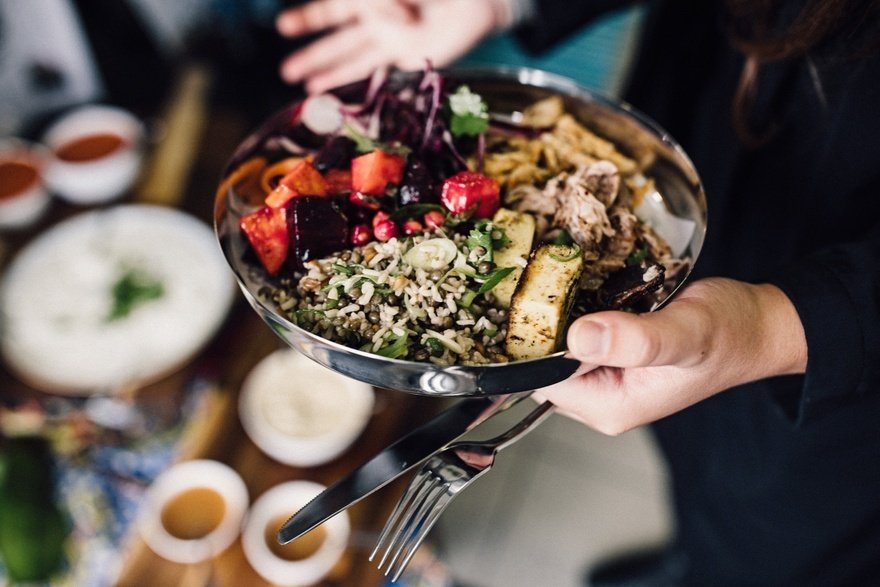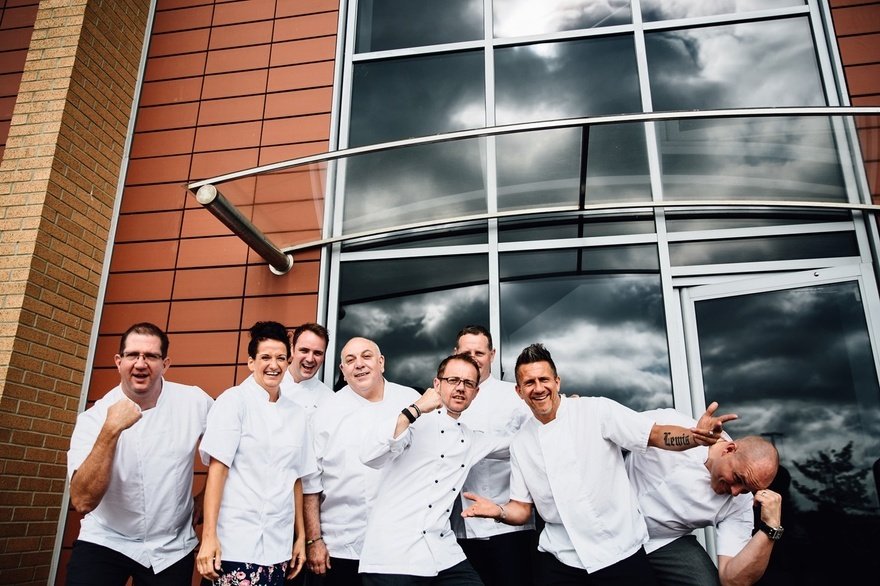With their policies of producing all food in-house (so they know what's in it), of promoting from within (everybody knows how to cook), and of always being the most expensive caterer at a pitch, Andrew Wilson and Carolyne Vale are the embodiment of quality over quantity. Janie Manzoori-Stamford meets them
"When we're bidding, we're one of the most expensive caterers. And if we're not, I wonder why I got it wrong, actually."
In a competitive tendering environment driven all too often by price, that's a bold position to take. But it's one of the defining characteristics of Wilson Vale. Founded by husband and wife team Andrew Wilson and Carolyne Vale in 2002, this is a caterer committed to quality over compromise.
"We're more handmade shirt than mass production," Wilson continues. "We're more about artisan craft than volume."
In terms of business performance, this bespoke approach has garnered impressive growth from humble beginnings. The couple launched with £50,000 of savings, a laptop and a spare room above the garage. Today, the company has a projected annual turnover approaching £36m for the next financial year and shiny new headquarters in Leicestershire that cost £1.2m to fit out when they "could have taken the standard product and maybe spent £200,000".
So, in a world where price is the biggest consideration, how have Wilson and Vale carved a niche that prioritises quality ahead of cost?
Everybody's a chef
"When we set up, we had a very singular vision of what we wanted to achieve. We stick to it, which is why it's worked exceptionally well. We haven't been tempted to acquire companies or do anything different. Our goal was quality, niche, slow growth with an emphasis on our food…" says Wilson.
"…and our people," adds Vale, concluding her husband's thoughts – they do this seamlessly and often. "We want to develop and promote people rather than recruit at the operations/area manager level. Our area managers are unlike any at other caterers. They are chefs. Every single one. So they have to be internal."
And while each one is in charge of a cluster of contracts rather than a single kitchen, it's clear that their chef backgrounds are of primary importance. Site visits invariably involve chef training alongside an ongoing programme of innovation in order to keep the offer fresh and exciting for its consumers and creators alike.
"If we didn't keep changing what we do, our customers would go off-site and our staff may as well be working on a factory production line. We have to change – what we're producing, how we're presenting it, how we market and package it – all the time," says Vale. "We're continually revamping."
The training carried out by the area managers is integral to Wilson Vale's ethos of up-skilling its workforce and giving every single employee the opportunity to cook.
This has been instilled in the business since day one. If a kitchen porter expresses an interest in food, they'll get the chance to learn, starting on cakes, working their way up through sandwiches and salads, and eventually landing at the stove.
As such, Wilson Vale took its experience of the NVQ system and created its CraftWorks chef management scheme – a tailored programme suited to both the needs of the business and the ambitions of each individual, with an array of modules that cover core practical skills, food development, management and even maths and English if desired.
"We've created a formal qualification that's recognised by us, but it can also be NVQ-assessed by one of our three accredited assessors if they want that too," says Vale. "It's win-win."
For the staff, that means solid career development opportunities, and to underline that point, it's worth noting that most area managers, three out of four operations directors, and managing director Alan Beddie were internal promotions.
For the business, that means a motivated workforce with a broad spectrum of culinary skills that meet Wilson Vale's demand to produce as much as possible on-site, from yogurts and granolas to breads and cooked deli meats (with specialist cured meats such as chorizo and salami the main exceptions).
Why is this so important to Wilson Vale? "So we know exactly what is it in it. So that we aren't relying on having to buy convenience products with lots of E numbers and chemicals in them," Vale explains.
"At the same time we're developing our people and getting them to their full potential and it's worked. That's why we only work for certain clients. It's not because we're snobby or arrogant. Our customer base is made up of people who appreciate good food."
First on quality
But surely well-trained staff producing quality cooking come at a cost to the client? Labour costs tend to be higher than that of competitors because the company is a Living Wage employer, says Wilson, but food costs are effectively lower because of in-house production.
"When we get a client on a visit, they meet our people and they can see [what we're about]. We never come second because people didn't think our quality was good enough," he says. Vale continues: "It would only ever be on price and if they couldn't afford us. And we accept that. Not everyone can."
The point they're making is there is a big difference between low cost and good value, and, according to Vale, theirs is a company that is always excellent value for money.
"Our view is that if you're investing £100,000, is £120,000 too much when you base it upon the difference in value? To me, that is what you have to make that judgement on," she explains. It's a familiar conversation that Wilson recently had with a new client. He says he suggested that the £5,000 a year generated from the 20% margin on prices would be better invested back into the catering to reduce the tariff. Then, instead of charging £1.20 for soup, charge 80p; more people will use it, they'll think their employer is wonderful and it will only cost the client £5,000, he explains.
"With the margin you've got to forget about percentages because it's about value," adds Vale. "When a client wants to put a tariff up by whatever percentage, I always ask whether it's worth it in monetary terms. In our average size contract, the difference that makes is so small on the bottom line that they'd be far better off to see it as a bigger [employee] benefit than to try and get a few hundred pounds."
The couple's attitude to costs is certainly striking. They're the first to admit that they could have spent significantly less on Wilson Vale's new Ashby-de-la-Zouch headquarters, which are a stone's throw from the old office. But it was a long-term investment, designed to provide the team with a workspace to be proud of that is built to last with sustainability in mind. It even includes a 49kw solar array on the roof that cost £50,000 and entirely powers the building. Does that pay for itself in the end? Yes, says Vale, but that isn't the point.
"It's more environmental. It's the right thing to do and that's what you've got to remember. Sometimes the margin isn't great on our food, but the right thing to do is feed people with good food so we cannot compromise. And we feel that way about the environment," she says.
"Some people think that everything should have a return," adds Wilson.
Faith in the future
Wilson Vale's long-term training, development and succession planning has paid dividends for the business, which today boasts an above-average staff retention rate and a skilled workforce made up of like-minded and engaged individuals. As such, Wilson and Vale – while still totally hands-on – have faith in their team to deliver on their operational values and client promises, which Vale describes as nothing short of fantastic.
"We have got some amazingly talented people. We trust and have every confidence in them," she says. "Our roles have changed tremendously and that's great. But there was no point in promoting people like Alan Beddie to managing director and others to operations directors if we didn't let them fulfil those roles – they would become frustrated.
"If Alan was having to ask me about everything, he's not an MD, is he? So I have every confidence in him because I know he'll make the best decision he can. That's what we all do. Even, I'm sure, David Cameron did!"
Ah yes, the B word. As Vale brought it up, albeit indirectly, does the prospect of Brexit keep them awake at night? No, because what will be, will be, and everyone – their catering and high street competitors – will all be in the same boat, she says.
Wilson continues: "It's such an unknown – how can you work it out? At the rate we're going, this could be going on another two to three years. I hope it's not, but it's the uncertainty that's a slight distraction."
There's no point making plans until they know what's happening, adds Vale: "That's the problem with the government. It's not focusing on moving forward with anything else. If we spent our day doing that, we wouldn't be developing our day-to-day product and offer."
So what's next for the business? The UK's contract catering sector has undergone an extended period of consolidation in recent years that has made Wilson Vale one of a handful of independent foodservice operators of significance left in the sector. With fewer boutique operators for clients to choose from, the opportunities for organic growth loom large.
Does Wilson Vale have a strategy to capitalise? "No, not really," laughs Wilson, who says the plan is to continue seeking eight to 10 like-minded clients annually, with 10 being an exceptional year.
"But we've got a reputation now and people are coming to us more and more. So we are capitalising on it, but we're not doing anything about it to get there," he adds. "The more companies that Bill Toner and co buy, the better, quite frankly. Yeah, bring it on."
Company policy: no emails on mobiles Smartphones have enabled individuals to conduct their business from anywhere in the world, except, perhaps, the leadership team at Wilson Vale. No one, from area managers up to Wilson and Vale themselves, has access to their work emails on their phones, and the reason is simple: no distractions.
"When you're on-site, the emphasis is on either developing the team or part of the product. We knew that from day one and we've never deviated from that," says Vale. "Our guys are chefs; they need to be in the kitchen."
That's not to say emails go unanswered; they're monitored centrally. Anything important is flagged with a phone call and dealt with from there.
"Some clients take a while to get into that [process]," says Wilson, who points out that even if he did have emails on his phone, he can't read them while he's driving anyway. And with the majority of clients located between Manchester and the M4, as well as others in Central London, Hampshire, Kent, Bristol and Scotland, Wilson spends a fair amount of time on the road.
But it's not just emails that Wilson and Vale don't want their team to deal with. It's anything that takes their chefs away from their core activities. So while relationships with the company's 450-strong list of suppliers are managed at site level, the admin is not.
"We don't burden our teams on-site with any computer systems like online ordering and payroll… none of that," says Wilson. "We've got some very sophisticated systems that we've invested a lot of money in, but it's all done here [at the company's head office in Ashby-de-la-Zouch], not by the chef in the unit."
For emphasis, Vale adds: "I want a chef cooking – I don't want them doing bookwork." But with the opportunity to streamline processes that technology offers, is Wilson Vale missing a trick?
"We'd make more money," says Wilson. "But then it would probably devalue the product and we'd end up with the same result."
Company snapshot
- Sectors B&I, education and conference centres
- Sites 99
- Staff 850
- Annual turnover £35.5m (forecast for 2019)
- Key clients Belron International, Hiscox, IM Group, Jack Wills, Kent College, New Day London, and Royal Institute of
- Chartered Surveyors
Continue reading
You need to be a premium member to view this. Subscribe from just 99p per week.
Already subscribed? Log In












